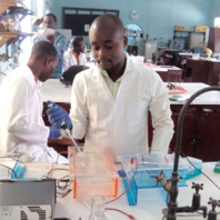Developing microbiology around the world
Issue: Future Tech
09 August 2016 article

The Society’s International Development Fund supports members’ development activities in low-income economy countries. We spoke to two previous recipients to find out more about their projects.
Professor Iruka Okeke, University of Ibadan, Nigeria
“It is important to me to teach at the highest level – the International Development Fund allowed us to make a high-impact curricular change and start a collaborative research project that engages students as well as faculty and staff members.”
In 2015, Iruka received Society support to transform the Masters course in Pharmaceutical Microbiology at the University of Ibadan, Nigeria. Iruka relocated to Ibadan from Haverford College, USA, after receiving an African Research Leader’s Award under the Medical Research Council/Department for International Development concordat agreement. She noticed that, due to resource limitations, graduates joining the Pharmaceutical Microbiology programme often had little microbiology wet-lab experience.
Society funding helped develop a discovery-based laboratory course, where students with limited previous experience of bacteriology learned practical skills in microbiology, molecular biology and bioinformatics via investigation of leaf microbiomes of plants used in Nigerian ethnomedicine. The project has brought the expertise of individuals in the department – bacteriologists, molecular biologists and natural product researchers – together around a new research endeavour. According to Iruka, the wet-lab and research training has been invaluable both for the development of the individuals, and future generations of microbiologists that they will go on to train.
Dr Dorina Timofte, University of Liverpool, United Kingdom
“Having worked in the UK for several years, I see major gaps that occur in antimicrobial resistance detection, surveillance and antimicrobial stewardship in countries like Romania. The grants were the perfect vehicles to enable significant impact in this area.”
Dorina received Society support in 2012 and 2014 for antimicrobial resistance (AMR)-focused projects in Romania. During previous collaborations in Romania, she noticed that one contributing factor for AMR was the lack of national guidance regarding routine testing and reporting methodology for detection of antimicrobial-resistant bacteria. As an Antibiotic Action champion, Dorina addressed this by implementing rapid diagnostic methods in order to improve patient care and prevent the spread of resistance in hospitals.
The first grant supported a workshop to exchange knowledge of detection methods for resistant bacteria in Romanian diagnostic laboratories. This was the first time such a meeting of human and veterinary microbiologists was held in Romania, and participants received protocols for detection of resistant bacteria to support implementation of routine testing. Dorina continued this work in 2014 by implementing a pilot scheme for detection of carbapenamase-producing Gram-negative bacteria (CPGNB) in Romanian hospitals. She established wide collaborations and generated evidence of the need for a national surveillance system to rapidly identify CPGNB-infected or colonised patients to allow implementation of appropriate infection control measures. Participating laboratories continue to use these protocols with the aim of them being implemented as part of a wider screening policy throughout Romania.
Advice for prospective applicants
Iruka: “Apply! The awards have truly transformative potential. The opportunities are far greater than we had predicted and we’re working on sustaining our discovery-based course.”
Dorina: “The Fund is a great way to help microbiology in less economically fortunate parts of the world. If you have an idea that fits with the remit of the scheme, do not hesitate to apply – you never know what opportunities it may lead to.”
The next closing date for the International Development Fund is 1 October 2016. Contact [email protected] for details.
MARIA FERNANDES
Professional Development Manager
[email protected]
Image: Discovery-based leaerning course: student Pelumi Adewole loading his agarose gel. Ayandiran Tunmise, PHM712 class..
